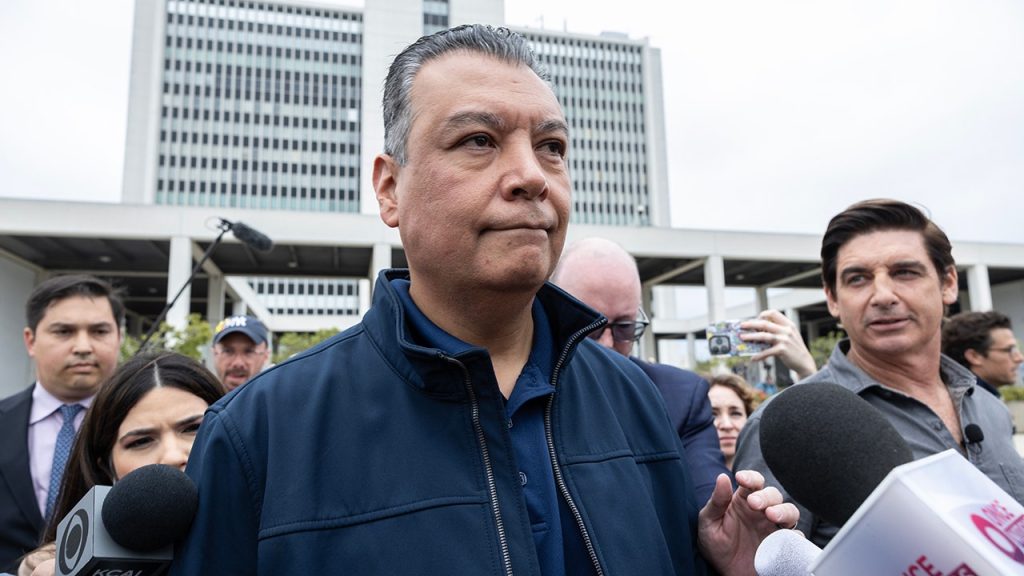In a recent press conference in Los Angeles, Senator Alex Padilla sharply criticized Vice President JD Vance for referring to him as “Jose,” an incident that has sparked considerable backlash from Democrats nationwide. The statement came during a tumultuous event where Padilla was forcibly removed while protesting deportation efforts by the Trump administration. Following the incident, Padilla took to national television, asserting that Vance’s remark reflects a lack of seriousness about the issues affecting communities in Los Angeles, particularly regarding immigration policy.
| Article Subheadings |
|---|
| 1) Incident at the Press Conference |
| 2) Padilla’s Response on MSNBC |
| 3) Critique of Administration’s Policies |
| 4) Impact on Local Communities |
| 5) Broader Political Implications |
Incident at the Press Conference
The incident unfolded during a scheduled press conference where Secretary of Homeland Security, Kristi Noem, was present. Padilla, a Democrat serving California, crashed the event to voice his opposition to the administration’s deportation strategies. His presence and subsequent removal by security created a media stir, drawing sharp criticisms from Republican counterparts who deemed the senator’s actions as disruptive. The forced removal resulted in a flurry of reactions across the political spectrum, with many Democrats expressing outrage over the treatment of Padilla, emphasizing that it underscored the turmoil surrounding immigration enforcement under the current administration.
Padilla’s Response on MSNBC
After the press conference incident, Padilla addressed the situation during an appearance on MSNBC. He stated that Vance’s remark of calling him “Jose” exemplified the “petty and unserious” demeanor that he associates with the Trump administration. Padilla further highlighted that such statements trivialize the serious issues communities face, particularly regarding immigration. “He knows my name,” Padilla emphasized, criticizing Vance for lacking the gravity necessary to discuss sensitive subjects, especially during a time of intense scrutiny over the administration’s policies.
Critique of Administration’s Policies
Continuing his critique, Padilla expressed concerns about the policies implemented by the Trump administration regarding immigration enforcement. He lamented the absence of communication between government officials and community leaders in Los Angeles. During his critique, he urged Vance to speak with law enforcement officials, including the Sheriff of Los Angeles County, to gain a better understanding of the backlash against deportation efforts. According to Padilla, many local officials are frustrated by the lack of coordination, arguing that these deportation strategies create unnecessary tension within communities and compromise public safety.
Impact on Local Communities
The sentiments expressed by Padilla reflect broader concerns within immigrant communities in Los Angeles, where many families live in fear of deportations. Padilla noted that individuals affected by these policies are not just statistics; they are real people with families and dreams. He asserted that Vance’s flippant remark detaches leaders from the realities faced by residents in his district who have been profoundly impacted by these policies. Furthermore, Padilla alleged that many members of the military deployed to handle anti-ICE protests are equally discontent, indicating a disconnect between federal directives and local sentiments.
Broader Political Implications
The exchange between Padilla and Vance represents a microcosm of the growing divide between parties on immigration issues. Such incidents can have lasting repercussions as lawmakers navigate a politically charged landscape. For Democrats, Padilla’s remarks serve to galvanize support within the immigrant community and their allies, while for Republicans, it poses an opportunity to assert authority on national security issues. This situation raises critical questions about how elected officials communicate with the communities they represent and the political ramifications of their choices during sensitive discussions.
| No. | Key Points |
|---|---|
| 1 | The incident at the press conference sparked backlash from Democrats across the country. |
| 2 | Padilla argued that Vance’s remark reflected a troubling attitude within the Trump administration. |
| 3 | Padilla called for improved communication between the administration and local law enforcement. |
| 4 | The impact of deportation policies is felt deeply within immigrant communities in Los Angeles. |
| 5 | Political divisions surrounding immigration issues reflect broader societal tensions. |
Summary
The recent events surrounding Senator Alex Padilla and Vice President JD Vance highlight the escalating tensions in U.S. immigration policy and its ramifications on local communities. As Padilla criticizes the administration’s perceived insensitivity towards affected families, this incident underscores the significant divide within American politics regarding immigration reform. The public discourse surrounding these issues not only affects policy but also influences voter perception ahead of upcoming elections.
Frequently Asked Questions
Question: What triggered the controversy between Senator Padilla and Vice President Vance?
The controversy stemmed from Vice President Vance referring to Senator Padilla as “Jose” during a press conference, which many saw as disrespectful and reflective of the broader attitudes of the Trump administration towards immigration issues.
Question: How did Senator Padilla respond to Vance’s comments?
Padilla responded on MSNBC, stating that Vance’s remarks exemplified the petty nature of the Trump administration, emphasizing that leaders should approach serious issues with sensitivity and respect.
Question: What are the concerns regarding the administration’s immigration policies?
Concerns include the perceived lack of communication between federal officials and local community leaders, which Padilla argues leads to confusion and heightened tensions regarding deportation efforts impacting vulnerable families.


